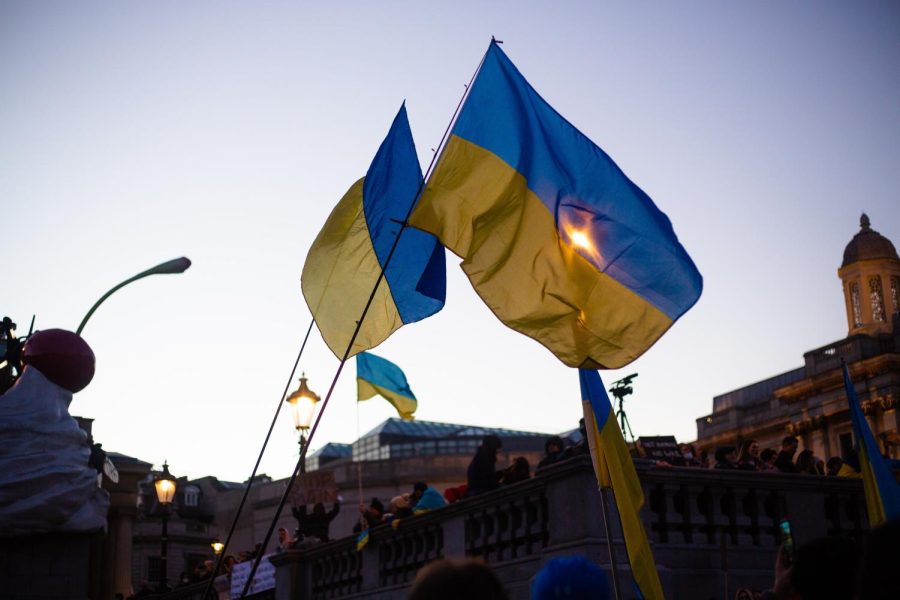Russia-Ukraine conflict continues
Mar 8, 2022
This previously ran in our February 2022 print issue.
After weeks of stalemate and bitter diplomacy reminiscent of the Cold War between the West and Russia, the U.S. deployed 3,000 troops to Eastern Europe this month in order to aid in the growing Russia-Ukraine conflict.
The conflict first arose after Western nations’ opposition to Russia’s annexation of Crimea in 2014. More recently, however, Russia has begun to amass troops along their border with Ukraine, striking fear of invasion among countless European leaders, as well as President Biden.
So why should the Emmaus High School community be so concerned about this looming conflict? History teacher John Gallagher said Russia’s threat over the sovereignty of another nation should always be a concern.
“Firstly, and worstly, [it’s]war between those two nations, other European countries and perhaps the U.S.,” Gallagher said. “Perhaps more likely, international economic sanctions that will further hurt the Russian economy if they work or at the very least, its oligarchy, including [Russian President Vladimir] Putin personally.”
Despite Ukraine being declared a sovereign nation in 1991, Putin has stated that he does not believe that Ukraine is a legitimate independent country. For many, the peril of war seems less daunting than the threat of Ukraine’s loss of freedom.
In 2014, Russia first invaded the Crimean Peninsula, a Ukrainian territory, annexing it as part of the Russian Federation. In published news reports, Putin stated that the reason for the invasion was “to ensure proper conditions for the people of Crimea to be able to freely express their will.” Shortly after the invasion, the U.S. and the European Union enacted sanctions against Russia. The U.S. and the European Union incited Russia to pull out of Crimea.
NATO (North Atlantic Treaty Organization) – of which Russia is not a member– works to ensure the freedom and security of the allied countries.
According to the United States Department of State, Russia has made several accusations against NATO, saying, “NATO has plotted against Russia since the end of the Cold War, encircled Russia with forces, broken supposed promises not to enlarge, and threatened Russia’s security with the prospect of Ukrainian membership in the Alliance.” Gallagher said, “[that some] NATO members may decide that Ukraine is not worth getting into economic or military conflict over — both of which may hurt both, or all, sides, especially Russia’s European trading partners.” However, Gallagher believes that Russia’s accusations against NATO have little to no validity.
“The claims are just outright lies. Putin fears the expansion of NATO because it makes him look bad and may threaten the money going into his pocket and those of his oligarch cronies,” Gallagher said.
According to government and politics teacher Brian Pum, the lack of action taken by outside countries is unacceptable.
“We have let Russia get away with too many things. We need to meet Russia with the same force they are giving,” Pum said.
Many countries are dependent on the exports of other countries. For instance, Germany is very dependent on Russian oil exports. This could be key motivating factor in their non-action in the Russia-Ukraine crisis.
There have been several attempts by the allied forces to peacefully negotiate with Russia in order to find a non-combat resolution. President Biden has held several meetings with Putin recording the current events. In these meetings, Biden made it very clear that if Russia were to escalate their military attacks on Ukraine, they would meet Russia with the same force.
Even in our little town of Emmaus, this conflict could affect our generations and those to come. If the U.S. becomes more deeply involved in this conflict, it could impact the country in various ways. The U.S. is already deeply divided among party lines. A conflict of this nature could worsen this divide. In regards to the economy, military conflict could deter investments in the stock market and the expansion of business. Furthermore, the supply chain crisis could worsen due to the potential negative impact on the world economy.
As of last week, nations from all around the world had military personnel on standby.












